My Baby Scratches Their Head a Lot: Should I Be Concerned?
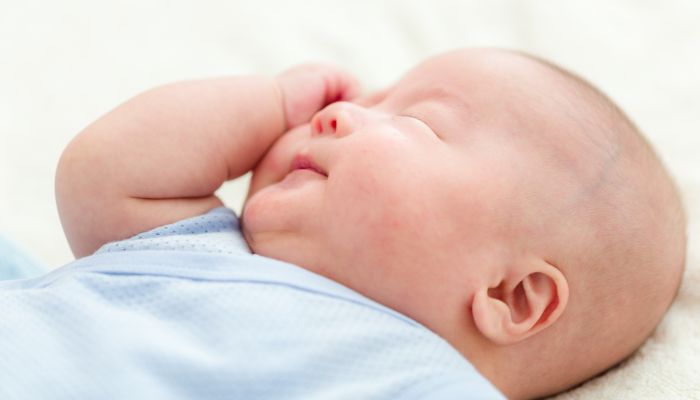
- It’s normal for babies to scratch their heads. It’s a natural reflex and a signal that an area on their body needs attention.
- It’s never too early to start a skin care regimen for your baby. Use gentle, fragrance-free moisturizers for your baby’s skin.
- Save baby mittens for sleep time. Your little one needs free hands to explore and develop his sensory system.
- If your baby’s constant scratching causes skin irritation to spread, consult his pediatrician.
Your baby’s perfect head is covered in scratch marks. Maybe scratching his head has become a habit. If this sounds familiar, you may be doing a bit of head-scratching of your own trying to figure out why your baby scratches his head.
In many young babies, actual scratches on the head and face are likely accidental and due to uncontrolled hand movements. These types of scratches are generally not a big concern beyond making sure they don’t get infected. But if it seems like your baby is deliberately scratching because they’re itchy then you’ll want to address the problem.
Common reasons for babies to scratch include overwashing, dryness, and allergies. Another reason might be eczema. If you notice constant scratching, keep a record of it. You may want to include information about your baby’s diet, clothing material, detergent brand, and anything else you put on their skin.
Keep in mind that your baby’s skin is an amazing organ. It constantly sheds, renews, and makes up the beautiful little human that’s before you. His built-in reflex that tells him to scratch an itch is also a thing to appreciate. Think of it as a method of communication to you—his body needs attention somewhere.
With a bit of close observation, recordkeeping, and patience, your baby’s scratching can be addressed and remedied.
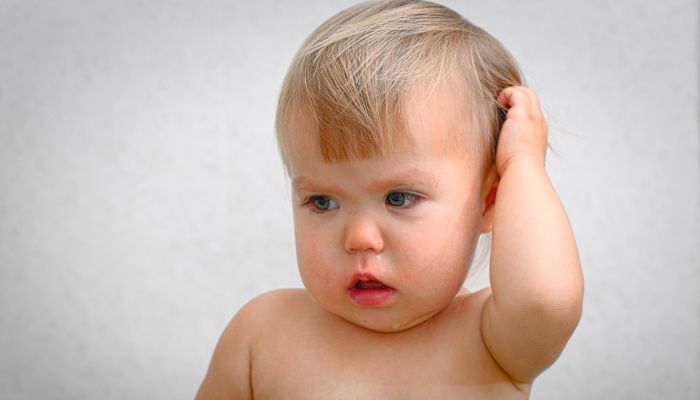
Is It Normal for a Baby to Scratch Their Head?
When there’s an itch, can you resist scratching it? Babies are no different. It’s normal for babies to scratch their heads.
Babies endure a multitude of skin issues. Their tender skin constantly sheds and adjusts to elements outside the womb.
Some common culprits that cause babies to scratch their head include:
- Too-frequent bathing. Your well-intentioned attempt to keep your baby squeaky clean with frequent baths may be removing the natural oils from his skin and causing dryness.
- Harsh chemicals in baby shampoo. If your baby has sensitive skin, these can also lead to an itchy scalp.
- Dryness. Baby skin is susceptible to moisture loss, which can cause dryness. Dryness can be uncomfortable and itchy for your baby.
- Eczema. The onset of eczema usually occurs before the age of one. Eczema most commonly appears in babies as a dry, scaly rash on the cheeks, trunk, scalp, hands, or feet.
- Cradle Cap. Cradle cap is a rash that can form on the scalp and face. It’s identified by greasy, scaly patches and tends to disappear between 6 months and one year of age. Keep in mind, however, that cradle cap is not usually itchy, so it’s unlikely to be a culprit for scratching.
- Allergies. If your baby is allergic to a type of food or material, skin irritation may appear on his head.
Your Baby Scratches the Back of Their Head
If you notice your baby scratching the back of his head, he may just be tending to an itch that’s causing him discomfort. Your baby may also be tired and indicating that it’s time for a nap. Scratching the back of his head can serve as a self-soothing method.
Your Baby Scratches Their Face
A newborn baby’s startle reflex is meant to protect him by quickly throwing out his arms and legs. With very little control of his hands, your baby may accidentally scratch himself. The skin on your baby’s face, unfortunately, might take the brunt of it.
Additionally, as your baby embarks on some face exploration, he is engaged in healthy development behavior. Just bear in mind that he may conclude his exploration with an accidental scratch on his face.
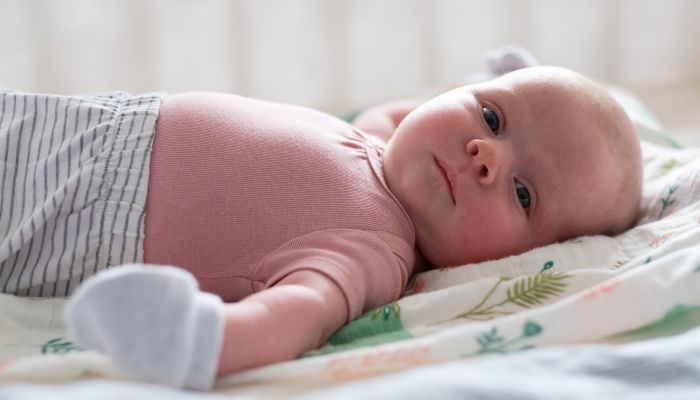
Your Baby Scratches Their Head at Night
Babies with eczema tend to scratch more often at night. This is likely because a drop in body temperature at night can cause skin to become itchier. If your baby scratches his head at night, it’s likely his scratching disturbs much-needed sleep—for everyone.
Here are some tips for your baby to scratch less and get a good night’s rest:
- Treat your baby to a soothing bath that includes skin-friendly oatmeal and calendula. Avoid bubble products as they can irritate the skin.
- Pat your baby’s skin dry with a soft towel.
- Moisturize your baby with a fragrance-free cream as soon as he’s out of the water to lock in moisture.
- Dress your baby in comfortable pajamas made from 100% cotton or linen. Use hypoallergenic blankets and sheets for his bed. Avoid materials like polyester and wool, which can cause itchy skin.
- Use a humidifier if the weather is dry.
- Keep your baby’s room at a comfortable, cool temperature. Sweat may cause itchiness, too.
- Baby nails are notorious for being razor-sharp. Using an emery board, file your baby’s nails—including those sharp corners.
- If your baby’s hands make their way to his little head while he’s asleep, it’s less likely he’ll wake up or hurt himself by scratching his head with sharp nails.
- Place scratch mittens over your baby’s hands. Mittens may not be necessary, though, if you keep your baby’s nails trimmed and filed.
Your Baby Scratches Their Head When Upset
Besides crying and turning red, babies have other devices to show that they’re upset. Some babies scratch their head to demonstrate unhappiness.
Your baby might have jerky movements when he’s upset, increasing the likeliness that he’ll scratch his head more furiously. This may cause worry as your baby navigates the often tricky emotional development. Stress and anxiety trigger itching, making your child’s emotions and physical discomfort even more upsetting.
Remain patient and gently guide your baby’s hands away from his head. Remove your baby from as much stimulation as possible by going to a quiet room where he can calm down. Keep track of events and activities that tend to upset him and avoid those.
Your Baby is Rubbing Their Head
Some babies rub their heads to self-soothe. If your baby is approaching naptime, he might scratch his head due to tiredness. Overstimulation may also cause your baby to rub his head.
Head rubbing might be accompanied by tugging at his ears and drooling if your little one is starting to get new teeth.
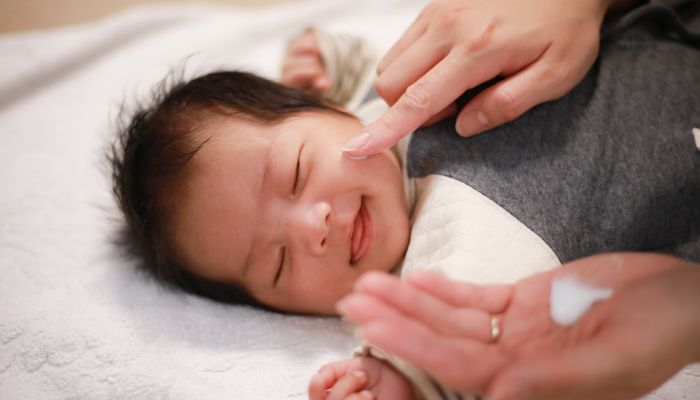
How Can I Stop My Baby from Scratching Their Head?
Here are some ways to prevent your baby from scratching his head:
- Retain moisture in your baby’s skin by using a fragrance-free moisturizing cream. Apply generously throughout the day. Avoid lotions as they tend to contain alcohol.
- Keep his nails trimmed and filed.
- Use mild soap and detergents.
- Gently brush your baby’s hair to remove dry flakes.
When Should You See a Doctor?
Keeping your baby’s skin moisturized and using over-the-counter treatments may keep itching at bay. If your baby’s scratching persists, worsens, or other symptoms appear, consult with their doctor.
Here are other signs you may need to visit the doctor:
- There is no improvement with over-the-counter treatments.
- Prescribed medication stops working.
- Your baby develops a rash, or skin starts to ooze, bleed, develops sores or blisters, or looks swollen—it might be infected.
- There are flat red spots on the skin.
- Your baby scratches multiple areas.
- A fever accompanies scratching.
- If your baby seems intensely uncomfortable or is unable to stop scratching
- If anyone in the household is known to be exposed to or diagnosed with scabies, lice, chickenpox, herpes simplex (cold sores), or other skin infections.
FAQs
What are the symptoms of eczema?
Your baby may have eczema if you see these signs:
- Circular red patches
- Dry, scaly skin
- Skin appears thick and leathery
- Skin is red and itchy
- When scratched, the area oozes
- On infants, patches are prominent on cheeks, forehead, and scalp
How do you treat a scratch on your baby’s face?
Small scratches heal quickly (within a matter of days) and usually don’t require bandages. If the scratch is deep, you can treat the scratch with these steps:
- Clean the scratch gently but thoroughly. Use a wipe or a cloth instead of a cotton ball—the fluff can stick to the wound.
- Pat the area dry.
- Apply a moisturizer or antiseptic cream.
- If you use a bandage, check it often. Be sure it’s not loose or grubby. Avoid using bandages at night unless the area is inaccessible to your baby. For example, a bandaid under zip-up jammies is okay; a bandaid on their finger or face is not because it can come off and pose a choking hazard.
What if my baby has a cold sore?
Herpes simplex (cold sores) can be really dangerous for babies, especially those under 6 months. These blisters (usually accompanied by fever) can be itchy, too, and they require evaluation by a pediatrician ASAP. To help prevent cold sores, caution caregivers (and anyone else!) not to kiss your baby if that person has a cold sore.
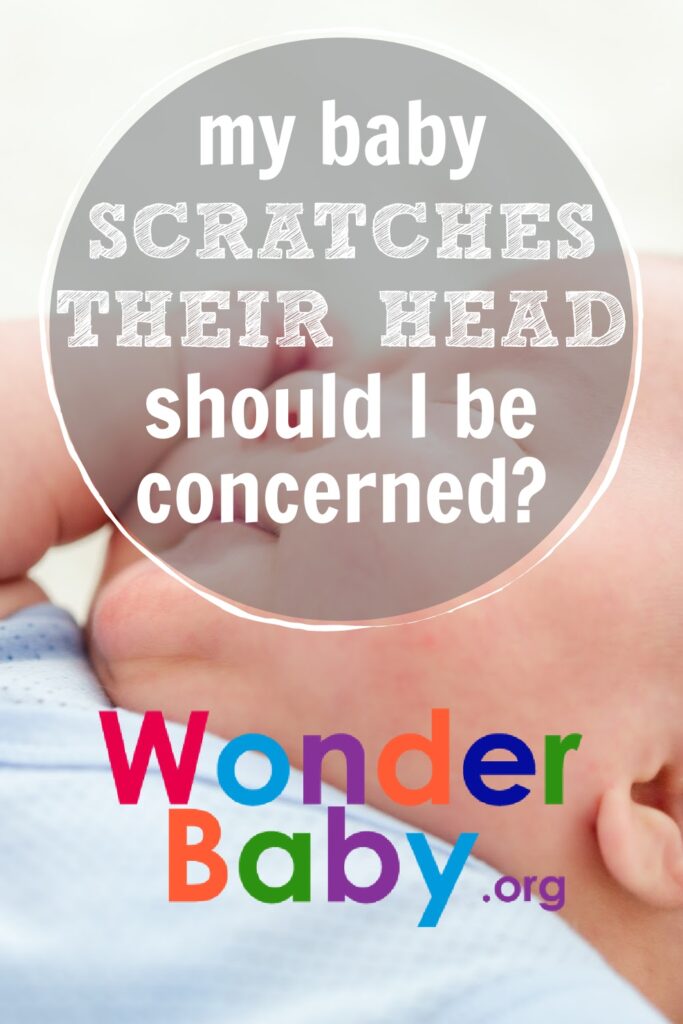
The information WonderBaby provides is not intended to be, and does not constitute, medical or other health advice or diagnosis and should not be used as such. Always consult with a qualified medical professional about your specific circumstances.
Related Posts

Eye Conditions and Syndromes, Visual Impairment
Neuralink Announces Plans to Restore Sight to the Blind with Brain Chip
Elon Musk’s company Neuralink has announced plans to begin human trials of its new “Blindsight” brain chip by the end of 2025.
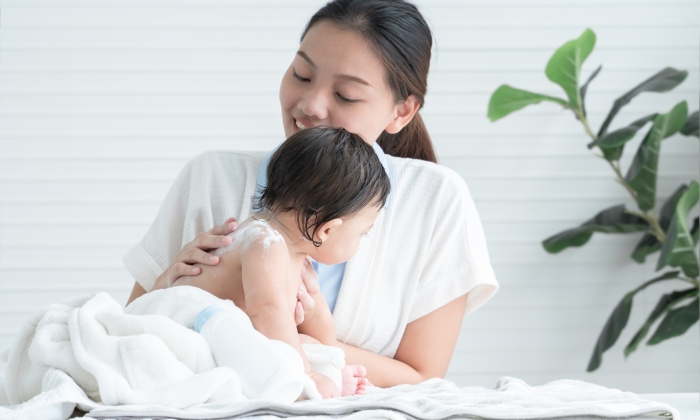
Health & Nutrition
Can Baby Skin Care Products Expire?
Is that forgotten tube of diaper rash cream still safe to use? Learn more about the expiration dates of popular skin care products for infants.

Health & Nutrition
Boosting Immunity in Kids: 3 Tips for a Healthy Winter
Parents can help boost their kids’ immunity during cold and flu season by maintaining healthy eating, sleeping, and exercising habits in the winter.